Alligators, aliens, and the occasional robot aren’t things you’d expect to find at a bucolic farm stand especially if you don’t know Rusty Gordon. Located just off State Road in West Tisbury, Gordon’s Ghost Island Farm beckons visitors with sprawling rows of crops and charming greenhouses. As you explore the space, the eccentricities begin to reveal themselves.
In keeping with its name, the farm’s sign at the foot of the driveway consists of a mouthless ghoul whose sheet takes the shape of the upside-down Martha’s Vineyard silhouette. Mannequins flank the farm stand door, clad in colorful dresses and patterned stockings. Dolls of the elfin, cherubic, and creepy varieties accompany some of the produce displays inside. Arriving for a pickup order, you might receive your produce from someone wearing an ape suit with a yellow bikini. Back in the day, you’d probably find a hearse or two parked outside as well. Gordon used them as working vehicles to transport his vegetables to the farmers’ market and around town. Having reached the end of their useful life, they’ve since been replaced by a boring but reliable pickup truck.
Not that you could say much of anything about Ghost Island Farm is boring. Not the giant inflatable pink flamingo that for a while took pride of place on the front lawn. Not the fake-snow machine attached to the roof. Not even the hours, which have been constant and sometimes grueling but never mundane. Not while Gordon and his longtime partner, Sarah Crittenden, are in charge.
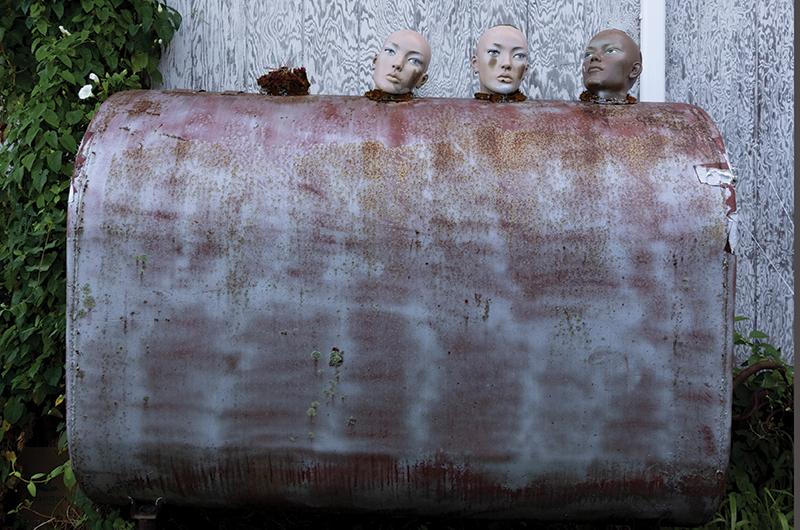
The pair of farmers first set up shop on the site of the old Nip ’n Tuck dairy farm in 2012. Gordon, a Lowell native, had moved to the Island in 1989 and spent two decades working at and managing Whippoorwill Farm in West Tisbury before striking out on his own. A farmer without a farm, and with the real estate market out of reach, he approached Fred Fisher Jr., who had inherited Nip ’n Tuck from his father and was no longer using the old dairy store that fronted State Road. Fisher agreed to lease them the shop and two acres of surrounding fields.
In those early days, Crittenden pulled double duty, dividing her time between work on the farm and at a landscape company to pay the bills and make their dream a reality. They set up a home in the upstairs of the dairy store, and set up shop downstairs, where they opened a modified community-supported agriculture (CSA) program. They filled the fields and hoop houses with salad
greens, cucumbers, garlic, onions, kale, beans, and tomatoes, and stuffed a giant spider and a few oddities here and there. That first summer, they also filled a black wooden coffin with all sorts of bounty from the fields and entered it into the annual Agricultural Fair produce contest, where it won a blue ribbon.
“It totally freaked our landlord out at first,” Gordon said of Fisher’s response to the farm’s chosen aesthetic. “He was like, ‘You guys…this is not a good idea. You’re going to scare away all your customers.’ We got a lot of, ‘You’re never gonna make it with a name like ‘Ghost’ and hearses,’” he said, earning a nod from Crittenden.
“Little did he know it became, like, our thing!” she exclaimed. Well, that and the quality of the food.
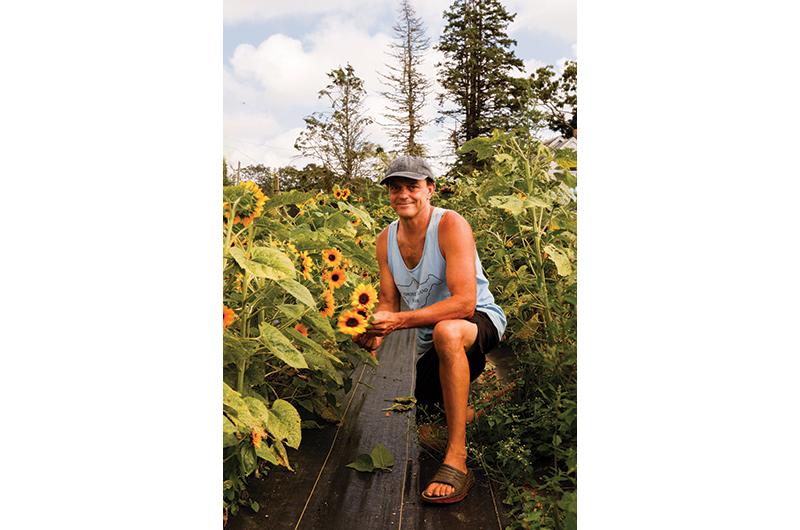
While the sight of a coffin turned cornucopia at the Agricultural Hall caused a stir that first year, it was the variety of vegetables inside that earned them the top award, beating out more established farms. That same quality of vegetables – all grown from non-GMO and non-treated seeds, using organic (but non-certified) practices – has kept discerning customers coming back for the past eleven years. During that time, almost everything about the farm has grown. The initial CSA membership roll rose from fifty to 900 at last count. The leased two acres of fields turned into four, then into five, plus several greenhouses, thanks to Fisher. The hours went from high-season to year-round.
Gordon and Crittenden expanded their offerings, too, experimenting with different crops and unusual goods. They spruced up the store, adding a tomato dressed up like Princess Leia here, a two-pronged carrot wearing shoes there, and, yes, a few creepy dolls – all a nod to the couple’s quirky sense of humor. They queued up the record player with old jazz records and rounded out their homegrown offerings with Nip ’n Tuck meat and eggs, Mermaid Farm cheese and yogurts, MV Kimchi, Maison Villatte bread from Falmouth, plus a selection of market staples, such as butter, limes, and half-and-half. Crittenden made her own handmade soaps from calendula flowers, and dried and packaged spices. She sewed the vegetable-patterned curtains that adorn the windows and underneath the shelving units.
Today, the space has a lived-in, cozy feel – charming but not precious or striving, a little rag-tag, a little zany. Everywhere you look, the small details resemble labors of love. Which makes sense, given that Crittenden refers to the crops as her and Gordon’s babies. She speaks with passion and humor when describing the rigorous rearing process. Gordon concurs, with obvious pride.
“All the crops are doing surprisingly well this year,” he said, taking a break from harvesting last fall while a four-foot fake gator peeked out of the field behind him. “Even though we had this drought, we were watering every day and night. So I think things might’ve even gotten a little more water than usual, you know, as funny as it sounds.”
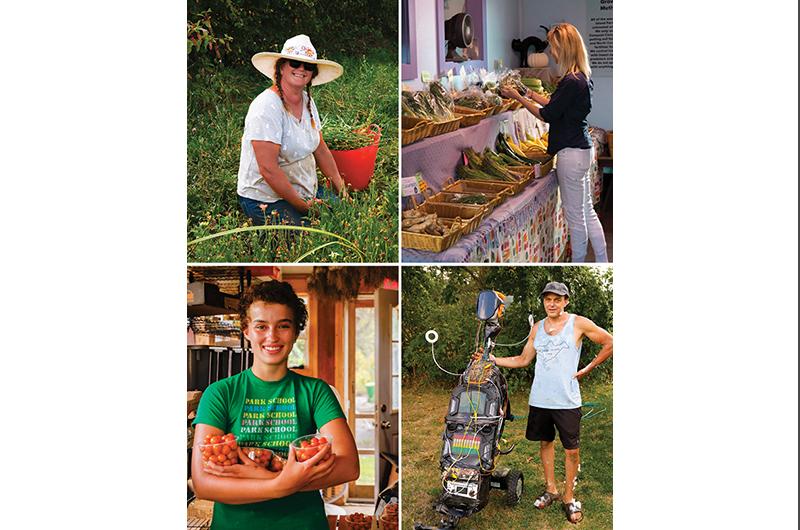
The pair have a joyful rapport, balancing one another out. Blonde and laid back, Crittenden spent her childhood on a farm in California and has an extensive knowledge of botany and biology, which, she said, is due largely to being surrounded by “science geeks” and “people crawling around in the woods looking for mushrooms or identifying the bird calls.”
Gordon, meanwhile, speaks with openness and speed, the cadence of his stories leaving room for wry quips. He becomes particularly animated when talking about tomatoes, Ghost Island’s main crop, and one that happened to cooperate last year. With more than 100 varieties some years, raised in high hoop tunnels, they enjoyed a robust stock of red beefsteaks, as well as the more demanding heirlooms.
They accept the hefty undertaking of the latter because it “adds an extra layer of enjoyment” for Ghost Island patrons, Crittenden explained. “It has a value. Maybe a lot of work, but it turns out to be worth it, because it brings people in.”
Gordon says he notices how excited customers are to see tomatoes on the vines, plus the opportunity to try unique varieties. In fact, his version of a CSA program encourages curiosity. Like a traditional CSA, Ghost Island members pay up front, typically either $250 or $500, which allows farmers to access funds when they need it most. Unlike a traditional CSA, members receive a 10 percent discount and the opportunity to select from any item in the store, rather than a pre-selected bag of the latest harvest.
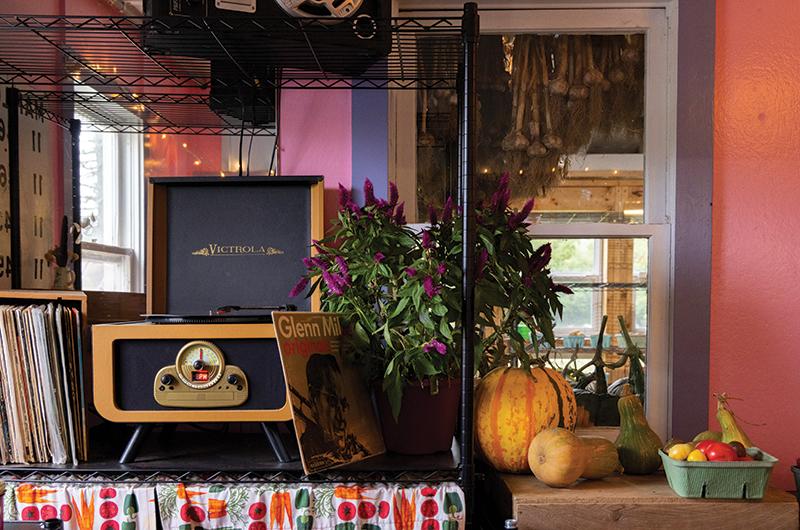
This flexible model makes sense to Gordon because there’s little waste and fresher products. “Some people like to shop every day; some people want what they want,” he explained. “Some people say, ‘It was interesting getting that bag; you know, getting new stuff?’ All around it’s a much better system, I feel.”
Members can also pick flowers from the fields for free, an activity that draws rave reviews and participation from a wide range of customers. Like the farm itself, flower-picking has grown in popularity over the years.
“Everybody is just, like, ‘This is my favorite thing to do on the Island,’” Crittenden said. “You see whole families out there picking flowers. Guys, girls, everybody gets out into the field and walks around with all the bees, or whatever fake creatures that Rusty leaves hanging around.”
“Some people come in and say, ‘Where’s the alligator today? I wanna see it,’” Gordon said, “because they don’t want to be scared.”
If it’s not fake reptiles or spiders, there’s always a chance of Gordon doing the scaring, both to his customers and his crew of workers. When not working in the fields, he’s been known to swap out the mannequins that surround the farm stand, don their clothes, and wait until an unsuspecting person walks by.
“I’ll just jump out and scare everybody, all the employees,” he laughed. “I’m surprised they stick around as long as they do, what they put up with.”
“It’s good for their hearts,” Crittenden teased. “Happens all the time,” Gordon shrugged.
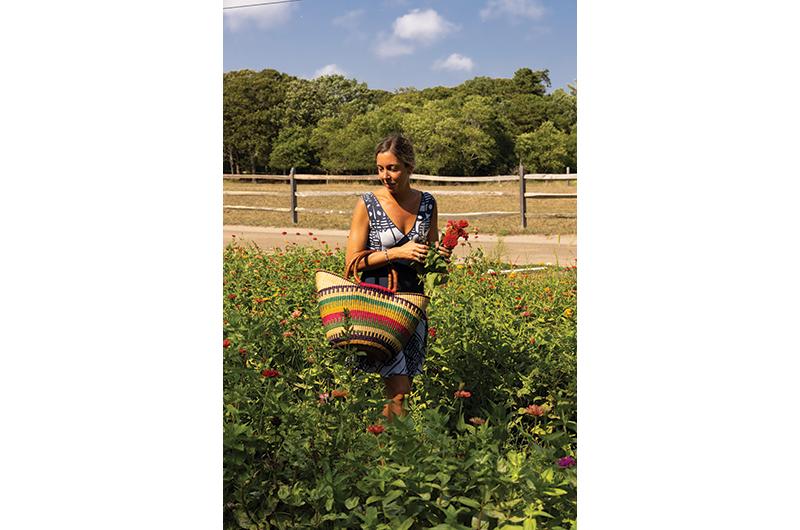
Judging by the many social media photos of employees posing with props around the farm – a disembodied mannequin hand high-five, a fake chainsaw murder scene – the crew appears to be in on the joke.
Most of the time.
A few years ago, Gordon pulled off an elaborate stunt while testing out a robot prototype. It was secretly being built in the greenhouse and only Crittenden was privy to the project. Ghost Island had just started their online ordering system, a pandemic addition that remains an option today. Once assembled, Gordon created an online ordering account for the robot, placed orders in the robot’s name, and had the robot arrive at the farm stand to collect the order from bewildered employees.
“And so the robot would drive up to the back door and say, ‘Hi, I’m coming to pick up an order for so-and-so.’ They were all freaking out at the store, like, ‘A robot! Oh, my God!’ The robot would take the groceries, drive down to State Road, turn, and zip away,” Gordon cackled and imitated an engine running. “Because it drives really fast.”
Gordon would then retrieve the robot once it was out of sight and hide it in the greenhouse. The mystery of the robot had employees and customers stumped for almost two weeks.
“Everyone’s amazed, people telling their friends,” Gordon recalled. “Then customers were here, seeing this robot pick it up and it was talking to customers. Everybody knew about it.”
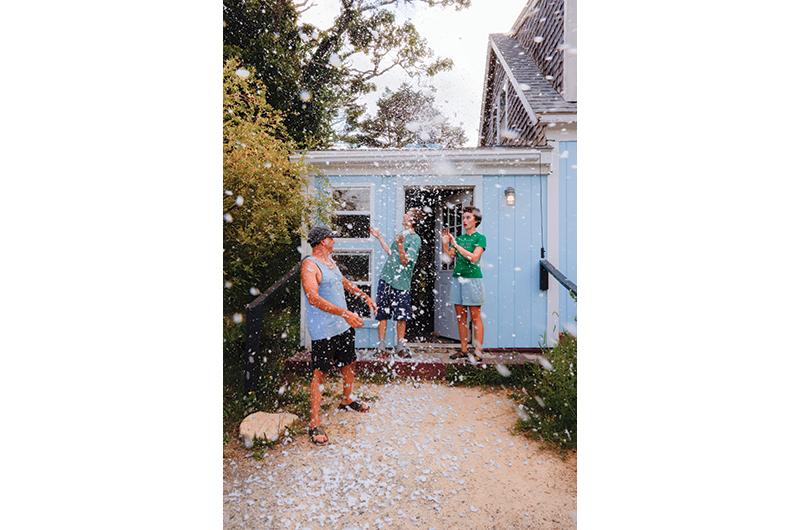
“It was epic. It will go down in history, so fantastic,” Crittenden concluded, poking fun at the more gullible employees.
Though the robot made for a memorable prank, Gordon also envisioned it serving a practical use. He shelved the project for the time being, but shared that it could be a fun tool for interacting with and talking to customers in the future. Perhaps it will coincide with the purchase of a replacement hearse, as Gordon said he “might have to wait to get another at some point down the road.”
“The rollers were really cool,” Crittenden remarked, “because you could roll heavy things in there, tables, that was really handy.”
Then again, not everything on the farm has a practical purpose. Some things are just for fun – like his penchant for Halloween and all its ghoulish, ghastly, weird little decorations. It’s an interest that dates to his childhood memories of Lowell, where Halloween was a big event. “Every day is Halloween around here,” said Crittenden.
Each year, as the zinnias in the front roadside field die back and the tomatoes and beans make way for winter squashes and sugar pumpkins, Gordon takes time out of his busy schedule to begin constructing an annual display. One year it was a cardboard robot (the kind that does not place online orders). Another, a massive face with fans for eyes and a menacing grate for a mouth. Last year, he went intergalactic.
Gordon said he’s lucky to have such “a big roadside place,” which enables him to pull off the impressive display. “Since we started, it’s been going on for so many years. The whole town, the whole Island, really likes it.”
And so, he keeps upping the ante. Last year, he donned an alien mask in an Instagram video, the background filled with outer space motifs. “My tasty people of earth,” he began, “I bring you a message. You have three days remaining until my people destroy you. Eat, drink, perform your mating rituals. Do whatever you please….Tune in Halloween night…and you will see for yourself! End transmission!”
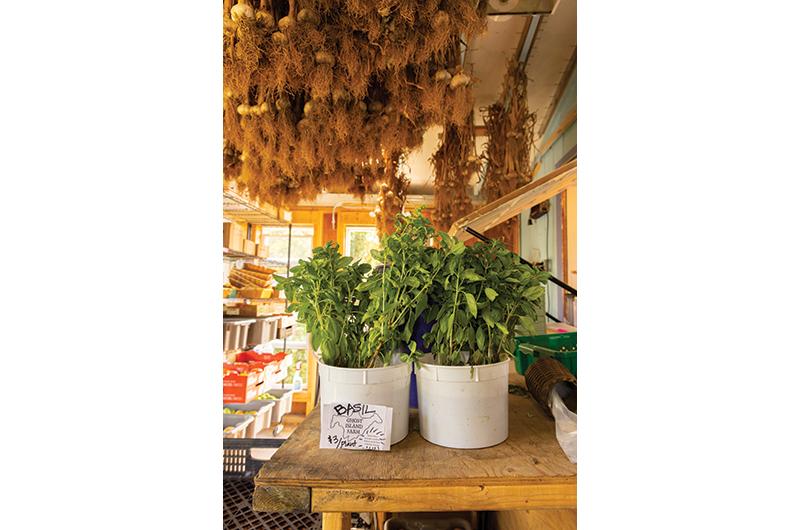
As it so happens, Gordon didn’t destroy the earth that night. Instead, on the eve of Halloween, he screened spooky movies in his field – including one by Gordon, and another stop-motion alien short made by one of his like-minded employees.
It’s not uncommon for people to seek out his displays at other times of the year, he noted, especially for those not around in the off-season. In the middle of summer he often receives inquiries about the “weird stuff” from those hoping that he left some spooky remnants behind.
“There’s definitely plenty of good stuff to look at still. There’s always just resident sculptures and goriness. Some of them have names,” Crittenden commented.
The combination of pastoral beauty and old-school farming and macabre hearses and aliens is admittedly an odd one. Fisher, their landlord, wasn’t crazy to suggest it wouldn’t work. Ironically, however, the visitor turnout suggests that they effectively welcome people in.
By opting for a nontraditional route, Gordon and Crittenden have created entry points for visitors to engage more with their food and explore new options. Try a new breed of tomato in the box behind the one-eyed doll. Dodge the softball-sized arachnid to assemble your bouquet. Wander through the fields to discover where the Martians are hiding. It might even be argued that Gordon’s extra-terrestrial efforts have, ironically, connected more people with the earth.
It’s not just a marketing, or a customer engagement ploy, either.
“It’s also for me too,” Gordon said of the décor’s purpose. He pointed to the pranks and decorations as a way to mitigate the 24/7 nature of owning a farm. For Crittenden, that mitigation involves sneaking the occasional after-lunch nap, which her grandfather would refer to as “changing his shoes.”
No strangers to the employment shortage faced by many Island establishments, the pair have taken on substantially more work usually distributed among a larger crew. They are “always looking for folks to work,” they said, but find Ghost Island to still be “a dream.”
“There’s the realization that we may never be able to retire,” Crittenden chuckled. “It’s a good life, though, and there’s a freedom in doing our own thing.”
“And we get to work every day, all day long!” Gordon said with a smirk and a fist pump.
As he addressed the joy brought on by the pranks, he assumed a more reverent tone.
“It’s important to have stuff like this, you know?”

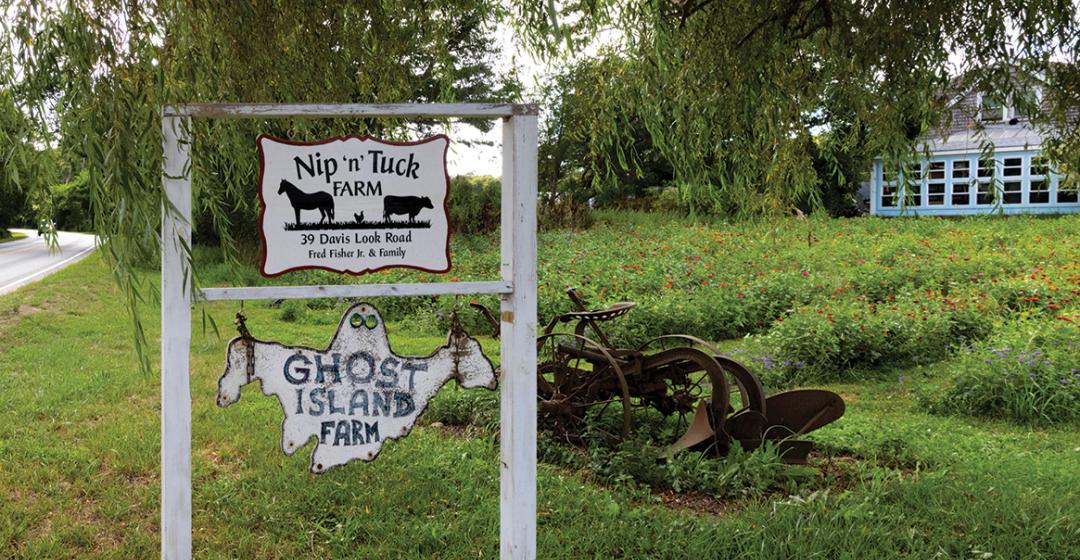


 1 comment
1 comment
Comments (1)